Tax Treatment for Foreigners and Foreign Businesses in Australia
VerifiedAdded on 2023/06/04
|9
|2473
|431
AI Summary
This article discusses the tax treatment for foreigners and foreign businesses in Australia. It explains the definition of a foreigner for tax purposes, the differences in tax rates and brackets between foreigners and Australian tax residents, and the implications of double taxation. The article also suggests reforms to improve the business environment and create equity and equality in taxation. Course code, course name, and college/university are not mentioned.
Contribute Materials
Your contribution can guide someone’s learning journey. Share your
documents today.
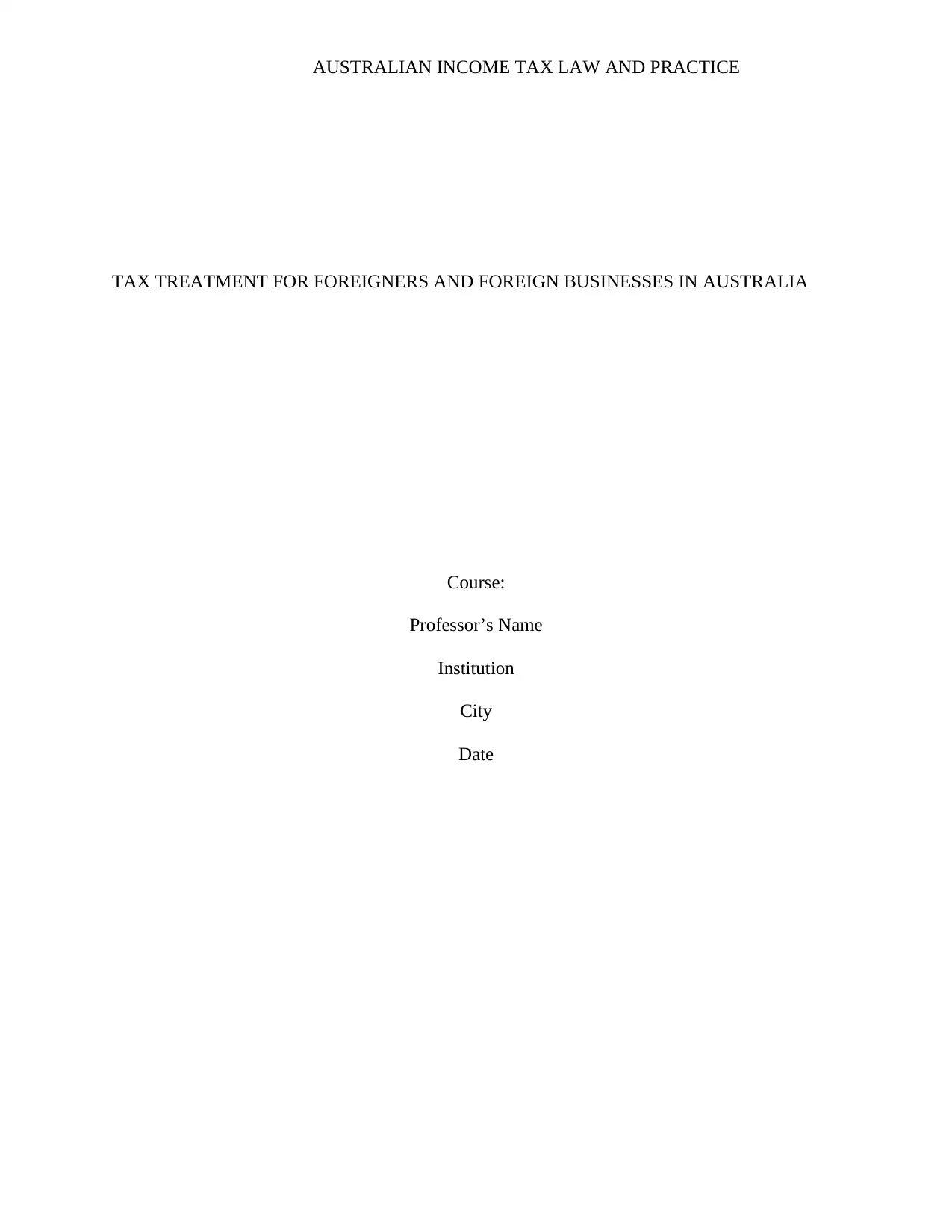
AUSTRALIAN INCOME TAX LAW AND PRACTICE
TAX TREATMENT FOR FOREIGNERS AND FOREIGN BUSINESSES IN AUSTRALIA
Course:
Professor’s Name
Institution
City
Date
TAX TREATMENT FOR FOREIGNERS AND FOREIGN BUSINESSES IN AUSTRALIA
Course:
Professor’s Name
Institution
City
Date
Secure Best Marks with AI Grader
Need help grading? Try our AI Grader for instant feedback on your assignments.
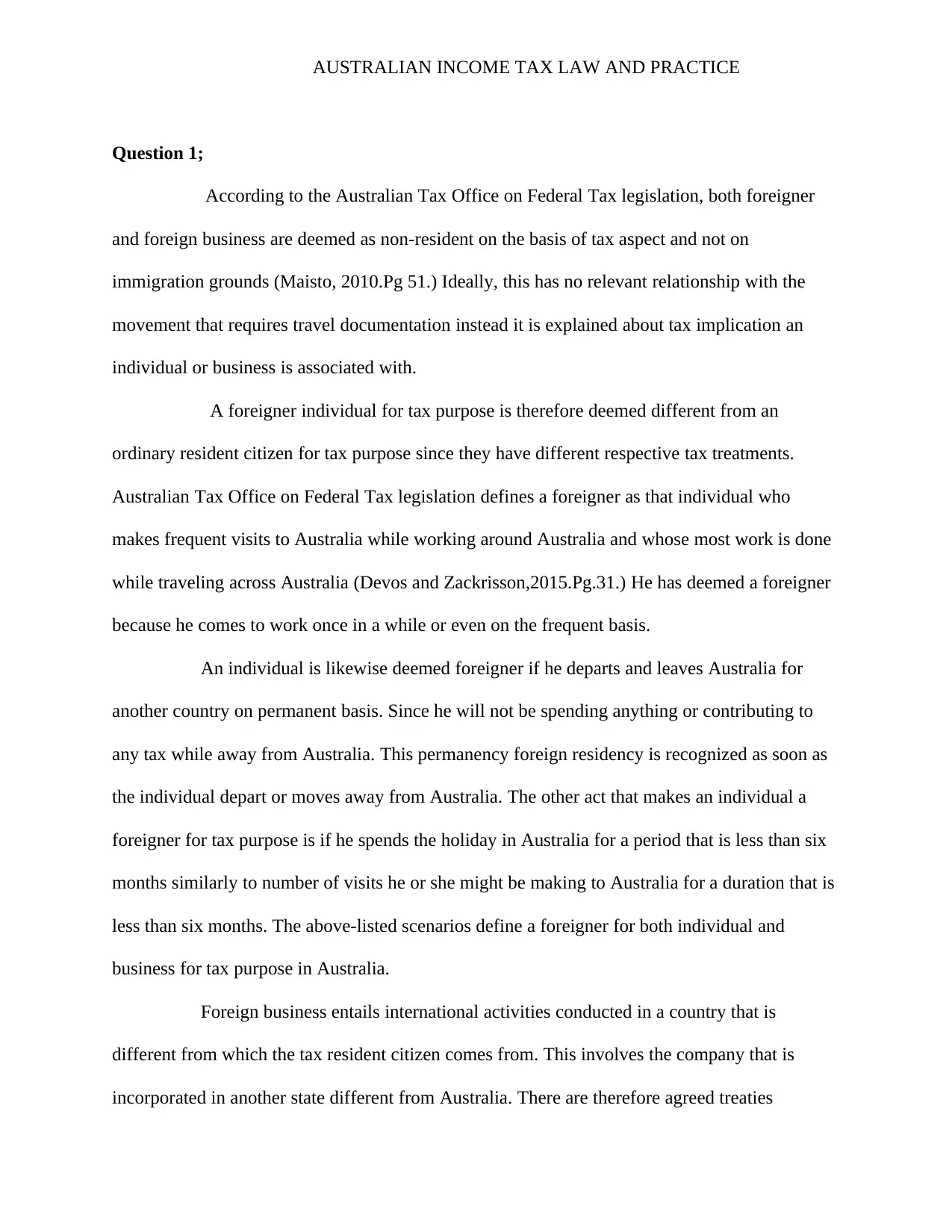
AUSTRALIAN INCOME TAX LAW AND PRACTICE
Question 1;
According to the Australian Tax Office on Federal Tax legislation, both foreigner
and foreign business are deemed as non-resident on the basis of tax aspect and not on
immigration grounds (Maisto, 2010.Pg 51.) Ideally, this has no relevant relationship with the
movement that requires travel documentation instead it is explained about tax implication an
individual or business is associated with.
A foreigner individual for tax purpose is therefore deemed different from an
ordinary resident citizen for tax purpose since they have different respective tax treatments.
Australian Tax Office on Federal Tax legislation defines a foreigner as that individual who
makes frequent visits to Australia while working around Australia and whose most work is done
while traveling across Australia (Devos and Zackrisson,2015.Pg.31.) He has deemed a foreigner
because he comes to work once in a while or even on the frequent basis.
An individual is likewise deemed foreigner if he departs and leaves Australia for
another country on permanent basis. Since he will not be spending anything or contributing to
any tax while away from Australia. This permanency foreign residency is recognized as soon as
the individual depart or moves away from Australia. The other act that makes an individual a
foreigner for tax purpose is if he spends the holiday in Australia for a period that is less than six
months similarly to number of visits he or she might be making to Australia for a duration that is
less than six months. The above-listed scenarios define a foreigner for both individual and
business for tax purpose in Australia.
Foreign business entails international activities conducted in a country that is
different from which the tax resident citizen comes from. This involves the company that is
incorporated in another state different from Australia. There are therefore agreed treaties
Question 1;
According to the Australian Tax Office on Federal Tax legislation, both foreigner
and foreign business are deemed as non-resident on the basis of tax aspect and not on
immigration grounds (Maisto, 2010.Pg 51.) Ideally, this has no relevant relationship with the
movement that requires travel documentation instead it is explained about tax implication an
individual or business is associated with.
A foreigner individual for tax purpose is therefore deemed different from an
ordinary resident citizen for tax purpose since they have different respective tax treatments.
Australian Tax Office on Federal Tax legislation defines a foreigner as that individual who
makes frequent visits to Australia while working around Australia and whose most work is done
while traveling across Australia (Devos and Zackrisson,2015.Pg.31.) He has deemed a foreigner
because he comes to work once in a while or even on the frequent basis.
An individual is likewise deemed foreigner if he departs and leaves Australia for
another country on permanent basis. Since he will not be spending anything or contributing to
any tax while away from Australia. This permanency foreign residency is recognized as soon as
the individual depart or moves away from Australia. The other act that makes an individual a
foreigner for tax purpose is if he spends the holiday in Australia for a period that is less than six
months similarly to number of visits he or she might be making to Australia for a duration that is
less than six months. The above-listed scenarios define a foreigner for both individual and
business for tax purpose in Australia.
Foreign business entails international activities conducted in a country that is
different from which the tax resident citizen comes from. This involves the company that is
incorporated in another state different from Australia. There are therefore agreed treaties
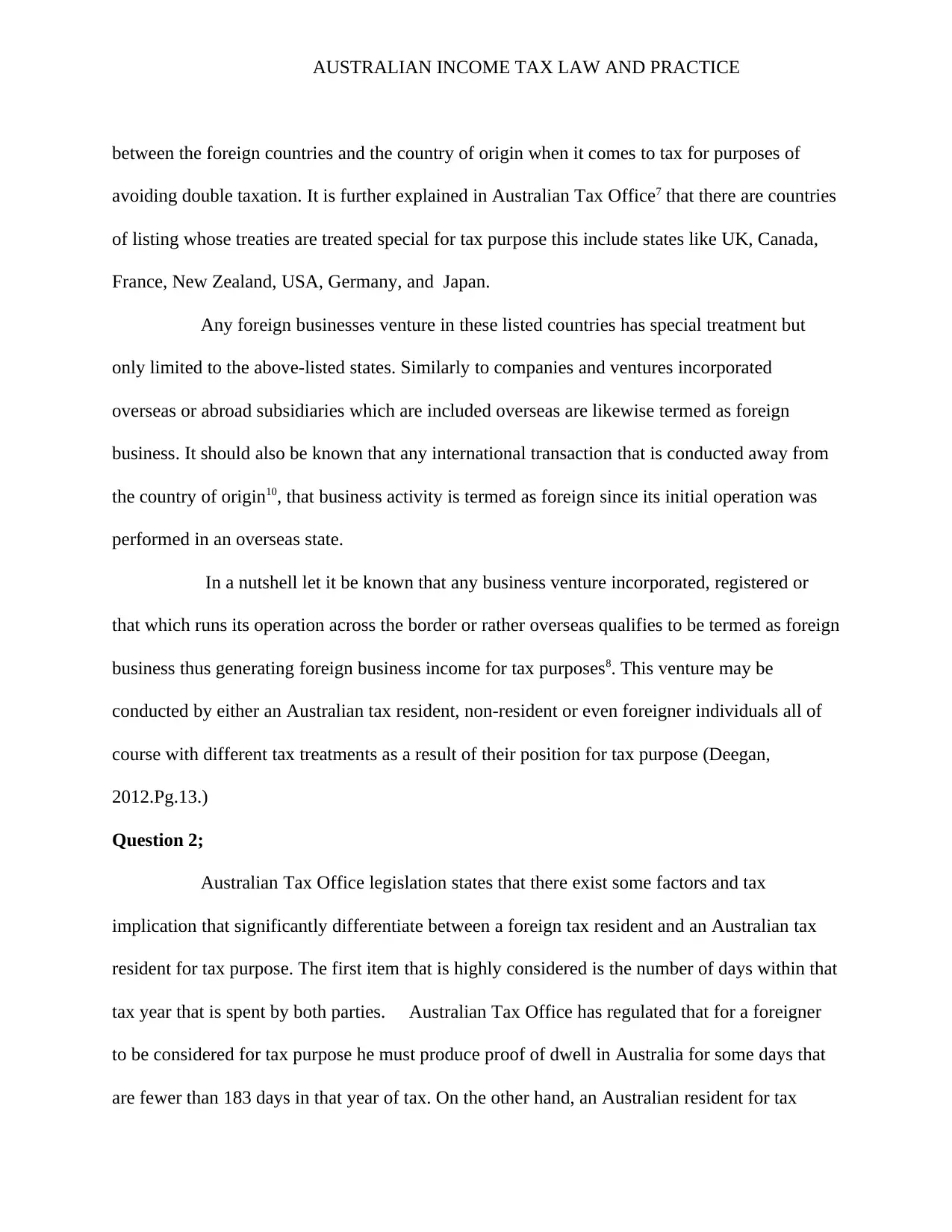
AUSTRALIAN INCOME TAX LAW AND PRACTICE
between the foreign countries and the country of origin when it comes to tax for purposes of
avoiding double taxation. It is further explained in Australian Tax Office7 that there are countries
of listing whose treaties are treated special for tax purpose this include states like UK, Canada,
France, New Zealand, USA, Germany, and Japan.
Any foreign businesses venture in these listed countries has special treatment but
only limited to the above-listed states. Similarly to companies and ventures incorporated
overseas or abroad subsidiaries which are included overseas are likewise termed as foreign
business. It should also be known that any international transaction that is conducted away from
the country of origin10, that business activity is termed as foreign since its initial operation was
performed in an overseas state.
In a nutshell let it be known that any business venture incorporated, registered or
that which runs its operation across the border or rather overseas qualifies to be termed as foreign
business thus generating foreign business income for tax purposes8. This venture may be
conducted by either an Australian tax resident, non-resident or even foreigner individuals all of
course with different tax treatments as a result of their position for tax purpose (Deegan,
2012.Pg.13.)
Question 2;
Australian Tax Office legislation states that there exist some factors and tax
implication that significantly differentiate between a foreign tax resident and an Australian tax
resident for tax purpose. The first item that is highly considered is the number of days within that
tax year that is spent by both parties. Australian Tax Office has regulated that for a foreigner
to be considered for tax purpose he must produce proof of dwell in Australia for some days that
are fewer than 183 days in that year of tax. On the other hand, an Australian resident for tax
between the foreign countries and the country of origin when it comes to tax for purposes of
avoiding double taxation. It is further explained in Australian Tax Office7 that there are countries
of listing whose treaties are treated special for tax purpose this include states like UK, Canada,
France, New Zealand, USA, Germany, and Japan.
Any foreign businesses venture in these listed countries has special treatment but
only limited to the above-listed states. Similarly to companies and ventures incorporated
overseas or abroad subsidiaries which are included overseas are likewise termed as foreign
business. It should also be known that any international transaction that is conducted away from
the country of origin10, that business activity is termed as foreign since its initial operation was
performed in an overseas state.
In a nutshell let it be known that any business venture incorporated, registered or
that which runs its operation across the border or rather overseas qualifies to be termed as foreign
business thus generating foreign business income for tax purposes8. This venture may be
conducted by either an Australian tax resident, non-resident or even foreigner individuals all of
course with different tax treatments as a result of their position for tax purpose (Deegan,
2012.Pg.13.)
Question 2;
Australian Tax Office legislation states that there exist some factors and tax
implication that significantly differentiate between a foreign tax resident and an Australian tax
resident for tax purpose. The first item that is highly considered is the number of days within that
tax year that is spent by both parties. Australian Tax Office has regulated that for a foreigner
to be considered for tax purpose he must produce proof of dwell in Australia for some days that
are fewer than 183 days in that year of tax. On the other hand, an Australian resident for tax
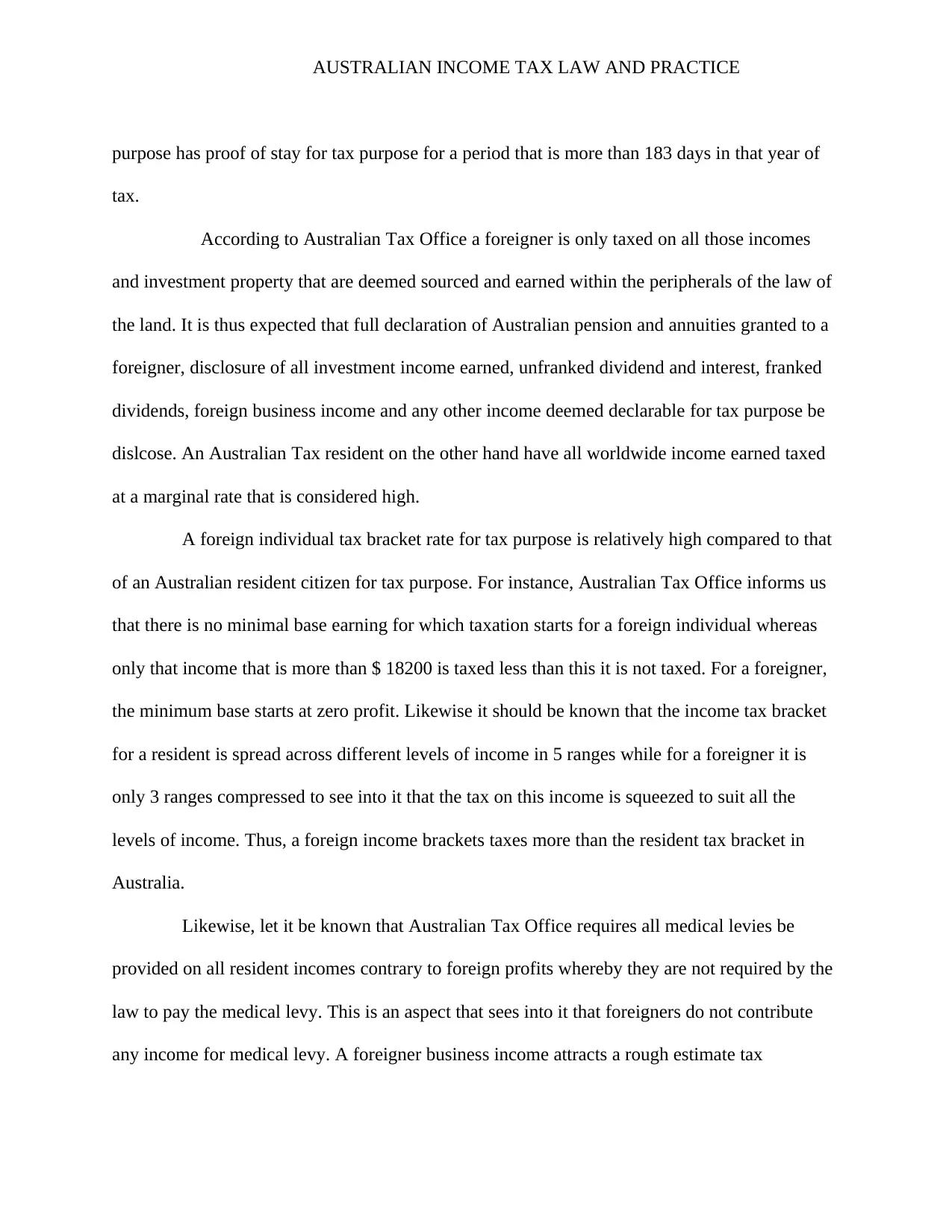
AUSTRALIAN INCOME TAX LAW AND PRACTICE
purpose has proof of stay for tax purpose for a period that is more than 183 days in that year of
tax.
According to Australian Tax Office a foreigner is only taxed on all those incomes
and investment property that are deemed sourced and earned within the peripherals of the law of
the land. It is thus expected that full declaration of Australian pension and annuities granted to a
foreigner, disclosure of all investment income earned, unfranked dividend and interest, franked
dividends, foreign business income and any other income deemed declarable for tax purpose be
dislcose. An Australian Tax resident on the other hand have all worldwide income earned taxed
at a marginal rate that is considered high.
A foreign individual tax bracket rate for tax purpose is relatively high compared to that
of an Australian resident citizen for tax purpose. For instance, Australian Tax Office informs us
that there is no minimal base earning for which taxation starts for a foreign individual whereas
only that income that is more than $ 18200 is taxed less than this it is not taxed. For a foreigner,
the minimum base starts at zero profit. Likewise it should be known that the income tax bracket
for a resident is spread across different levels of income in 5 ranges while for a foreigner it is
only 3 ranges compressed to see into it that the tax on this income is squeezed to suit all the
levels of income. Thus, a foreign income brackets taxes more than the resident tax bracket in
Australia.
Likewise, let it be known that Australian Tax Office requires all medical levies be
provided on all resident incomes contrary to foreign profits whereby they are not required by the
law to pay the medical levy. This is an aspect that sees into it that foreigners do not contribute
any income for medical levy. A foreigner business income attracts a rough estimate tax
purpose has proof of stay for tax purpose for a period that is more than 183 days in that year of
tax.
According to Australian Tax Office a foreigner is only taxed on all those incomes
and investment property that are deemed sourced and earned within the peripherals of the law of
the land. It is thus expected that full declaration of Australian pension and annuities granted to a
foreigner, disclosure of all investment income earned, unfranked dividend and interest, franked
dividends, foreign business income and any other income deemed declarable for tax purpose be
dislcose. An Australian Tax resident on the other hand have all worldwide income earned taxed
at a marginal rate that is considered high.
A foreign individual tax bracket rate for tax purpose is relatively high compared to that
of an Australian resident citizen for tax purpose. For instance, Australian Tax Office informs us
that there is no minimal base earning for which taxation starts for a foreign individual whereas
only that income that is more than $ 18200 is taxed less than this it is not taxed. For a foreigner,
the minimum base starts at zero profit. Likewise it should be known that the income tax bracket
for a resident is spread across different levels of income in 5 ranges while for a foreigner it is
only 3 ranges compressed to see into it that the tax on this income is squeezed to suit all the
levels of income. Thus, a foreign income brackets taxes more than the resident tax bracket in
Australia.
Likewise, let it be known that Australian Tax Office requires all medical levies be
provided on all resident incomes contrary to foreign profits whereby they are not required by the
law to pay the medical levy. This is an aspect that sees into it that foreigners do not contribute
any income for medical levy. A foreigner business income attracts a rough estimate tax
Paraphrase This Document
Need a fresh take? Get an instant paraphrase of this document with our AI Paraphraser
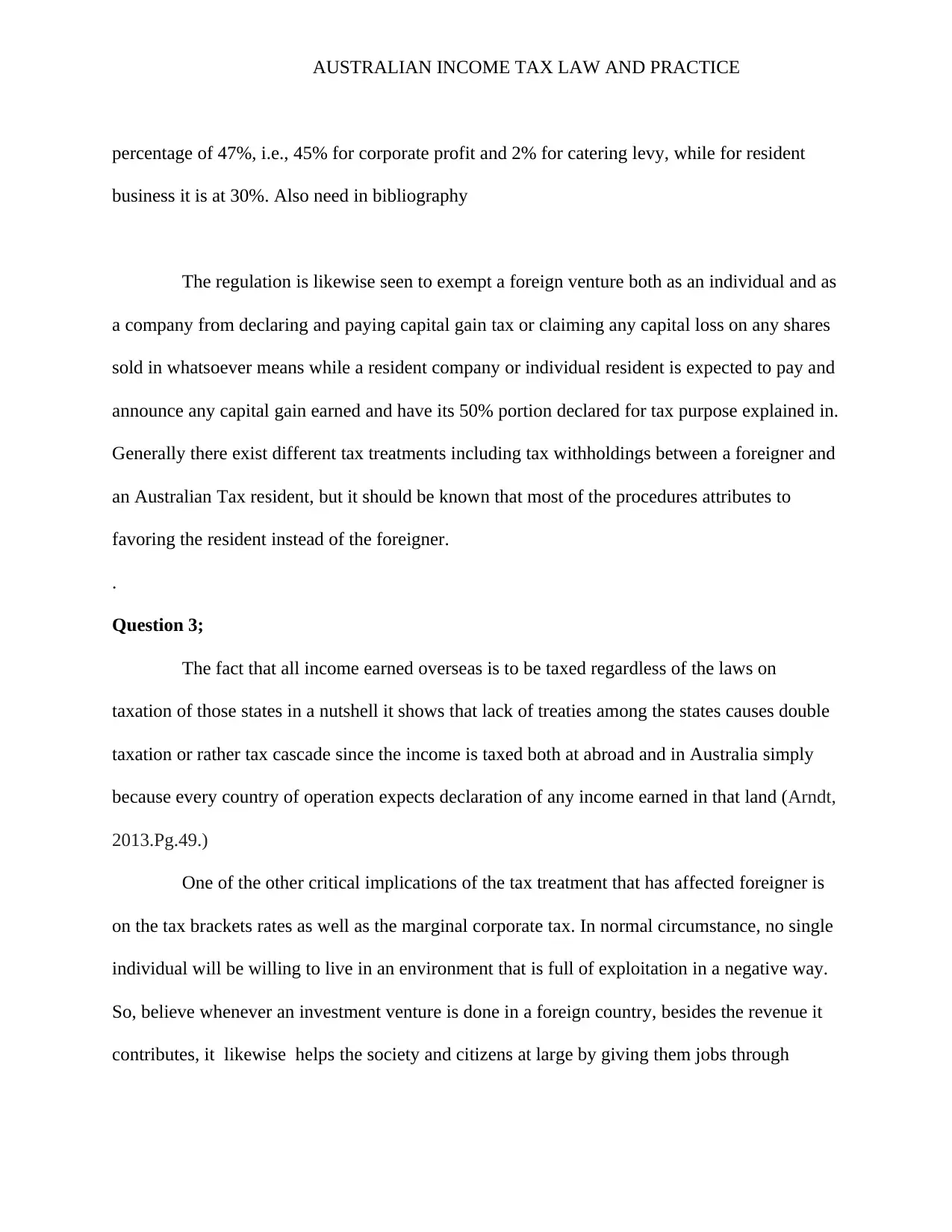
AUSTRALIAN INCOME TAX LAW AND PRACTICE
percentage of 47%, i.e., 45% for corporate profit and 2% for catering levy, while for resident
business it is at 30%. Also need in bibliography
The regulation is likewise seen to exempt a foreign venture both as an individual and as
a company from declaring and paying capital gain tax or claiming any capital loss on any shares
sold in whatsoever means while a resident company or individual resident is expected to pay and
announce any capital gain earned and have its 50% portion declared for tax purpose explained in.
Generally there exist different tax treatments including tax withholdings between a foreigner and
an Australian Tax resident, but it should be known that most of the procedures attributes to
favoring the resident instead of the foreigner.
.
Question 3;
The fact that all income earned overseas is to be taxed regardless of the laws on
taxation of those states in a nutshell it shows that lack of treaties among the states causes double
taxation or rather tax cascade since the income is taxed both at abroad and in Australia simply
because every country of operation expects declaration of any income earned in that land (Arndt,
2013.Pg.49.)
One of the other critical implications of the tax treatment that has affected foreigner is
on the tax brackets rates as well as the marginal corporate tax. In normal circumstance, no single
individual will be willing to live in an environment that is full of exploitation in a negative way.
So, believe whenever an investment venture is done in a foreign country, besides the revenue it
contributes, it likewise helps the society and citizens at large by giving them jobs through
percentage of 47%, i.e., 45% for corporate profit and 2% for catering levy, while for resident
business it is at 30%. Also need in bibliography
The regulation is likewise seen to exempt a foreign venture both as an individual and as
a company from declaring and paying capital gain tax or claiming any capital loss on any shares
sold in whatsoever means while a resident company or individual resident is expected to pay and
announce any capital gain earned and have its 50% portion declared for tax purpose explained in.
Generally there exist different tax treatments including tax withholdings between a foreigner and
an Australian Tax resident, but it should be known that most of the procedures attributes to
favoring the resident instead of the foreigner.
.
Question 3;
The fact that all income earned overseas is to be taxed regardless of the laws on
taxation of those states in a nutshell it shows that lack of treaties among the states causes double
taxation or rather tax cascade since the income is taxed both at abroad and in Australia simply
because every country of operation expects declaration of any income earned in that land (Arndt,
2013.Pg.49.)
One of the other critical implications of the tax treatment that has affected foreigner is
on the tax brackets rates as well as the marginal corporate tax. In normal circumstance, no single
individual will be willing to live in an environment that is full of exploitation in a negative way.
So, believe whenever an investment venture is done in a foreign country, besides the revenue it
contributes, it likewise helps the society and citizens at large by giving them jobs through
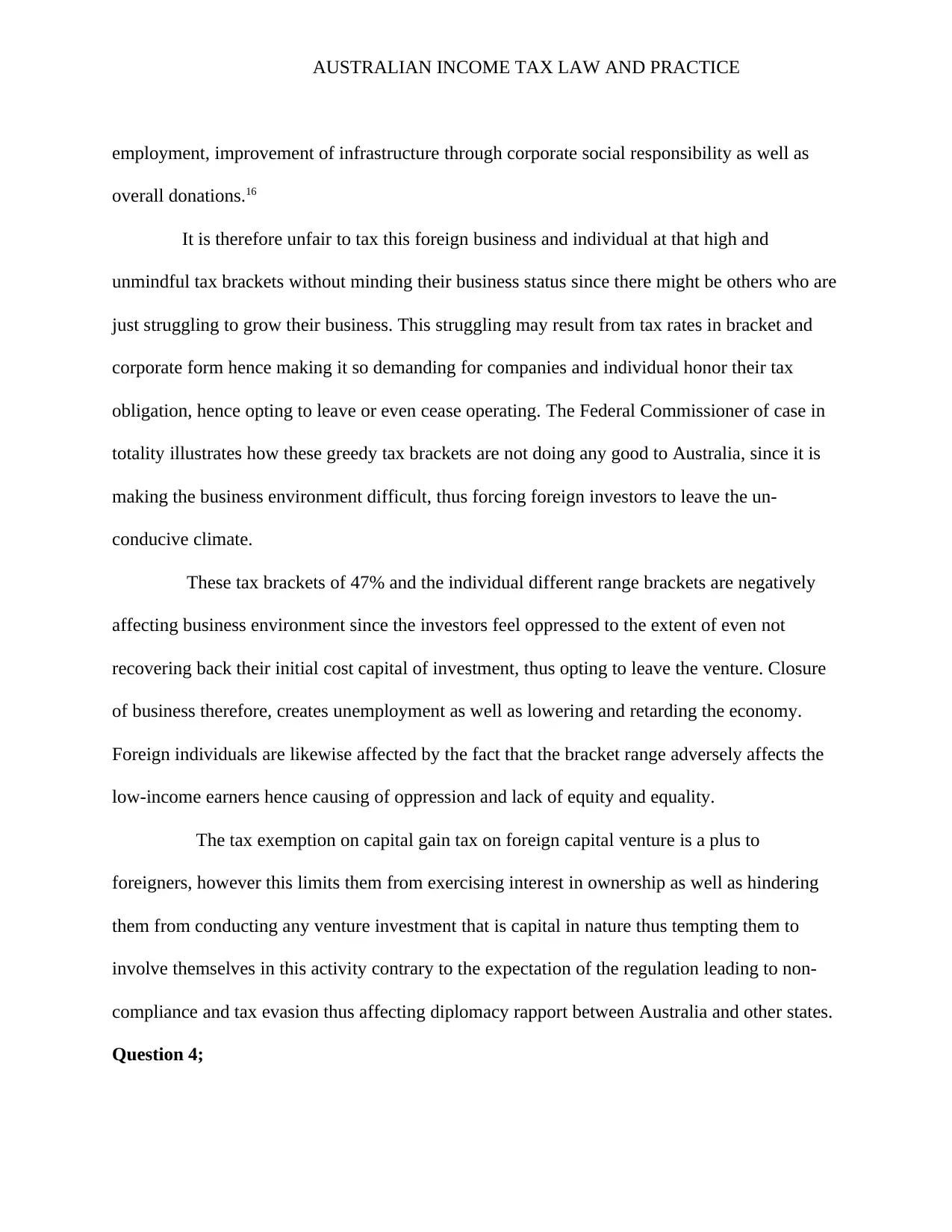
AUSTRALIAN INCOME TAX LAW AND PRACTICE
employment, improvement of infrastructure through corporate social responsibility as well as
overall donations.16
It is therefore unfair to tax this foreign business and individual at that high and
unmindful tax brackets without minding their business status since there might be others who are
just struggling to grow their business. This struggling may result from tax rates in bracket and
corporate form hence making it so demanding for companies and individual honor their tax
obligation, hence opting to leave or even cease operating. The Federal Commissioner of case in
totality illustrates how these greedy tax brackets are not doing any good to Australia, since it is
making the business environment difficult, thus forcing foreign investors to leave the un-
conducive climate.
These tax brackets of 47% and the individual different range brackets are negatively
affecting business environment since the investors feel oppressed to the extent of even not
recovering back their initial cost capital of investment, thus opting to leave the venture. Closure
of business therefore, creates unemployment as well as lowering and retarding the economy.
Foreign individuals are likewise affected by the fact that the bracket range adversely affects the
low-income earners hence causing of oppression and lack of equity and equality.
The tax exemption on capital gain tax on foreign capital venture is a plus to
foreigners, however this limits them from exercising interest in ownership as well as hindering
them from conducting any venture investment that is capital in nature thus tempting them to
involve themselves in this activity contrary to the expectation of the regulation leading to non-
compliance and tax evasion thus affecting diplomacy rapport between Australia and other states.
Question 4;
employment, improvement of infrastructure through corporate social responsibility as well as
overall donations.16
It is therefore unfair to tax this foreign business and individual at that high and
unmindful tax brackets without minding their business status since there might be others who are
just struggling to grow their business. This struggling may result from tax rates in bracket and
corporate form hence making it so demanding for companies and individual honor their tax
obligation, hence opting to leave or even cease operating. The Federal Commissioner of case in
totality illustrates how these greedy tax brackets are not doing any good to Australia, since it is
making the business environment difficult, thus forcing foreign investors to leave the un-
conducive climate.
These tax brackets of 47% and the individual different range brackets are negatively
affecting business environment since the investors feel oppressed to the extent of even not
recovering back their initial cost capital of investment, thus opting to leave the venture. Closure
of business therefore, creates unemployment as well as lowering and retarding the economy.
Foreign individuals are likewise affected by the fact that the bracket range adversely affects the
low-income earners hence causing of oppression and lack of equity and equality.
The tax exemption on capital gain tax on foreign capital venture is a plus to
foreigners, however this limits them from exercising interest in ownership as well as hindering
them from conducting any venture investment that is capital in nature thus tempting them to
involve themselves in this activity contrary to the expectation of the regulation leading to non-
compliance and tax evasion thus affecting diplomacy rapport between Australia and other states.
Question 4;
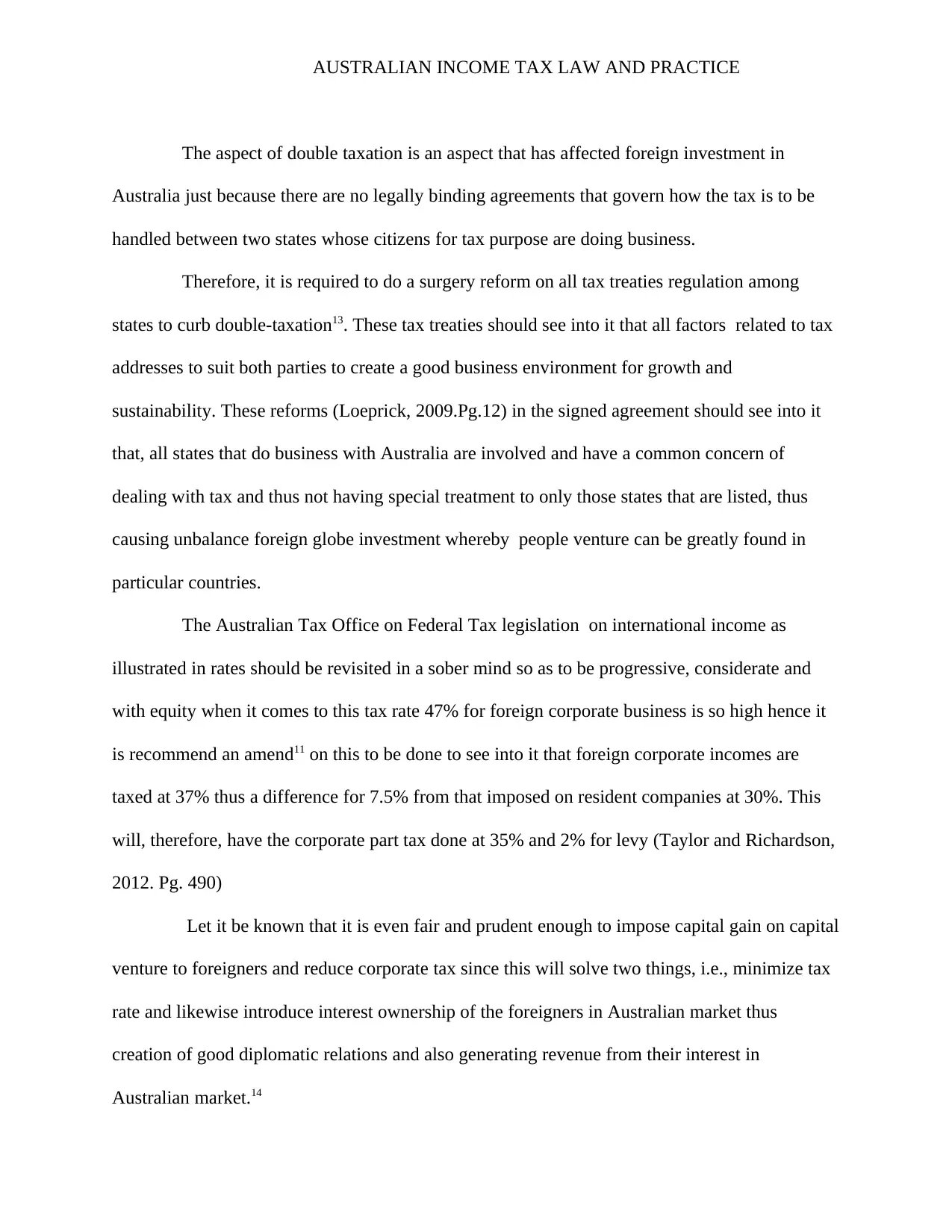
AUSTRALIAN INCOME TAX LAW AND PRACTICE
The aspect of double taxation is an aspect that has affected foreign investment in
Australia just because there are no legally binding agreements that govern how the tax is to be
handled between two states whose citizens for tax purpose are doing business.
Therefore, it is required to do a surgery reform on all tax treaties regulation among
states to curb double-taxation13. These tax treaties should see into it that all factors related to tax
addresses to suit both parties to create a good business environment for growth and
sustainability. These reforms (Loeprick, 2009.Pg.12) in the signed agreement should see into it
that, all states that do business with Australia are involved and have a common concern of
dealing with tax and thus not having special treatment to only those states that are listed, thus
causing unbalance foreign globe investment whereby people venture can be greatly found in
particular countries.
The Australian Tax Office on Federal Tax legislation on international income as
illustrated in rates should be revisited in a sober mind so as to be progressive, considerate and
with equity when it comes to this tax rate 47% for foreign corporate business is so high hence it
is recommend an amend11 on this to be done to see into it that foreign corporate incomes are
taxed at 37% thus a difference for 7.5% from that imposed on resident companies at 30%. This
will, therefore, have the corporate part tax done at 35% and 2% for levy (Taylor and Richardson,
2012. Pg. 490)
Let it be known that it is even fair and prudent enough to impose capital gain on capital
venture to foreigners and reduce corporate tax since this will solve two things, i.e., minimize tax
rate and likewise introduce interest ownership of the foreigners in Australian market thus
creation of good diplomatic relations and also generating revenue from their interest in
Australian market.14
The aspect of double taxation is an aspect that has affected foreign investment in
Australia just because there are no legally binding agreements that govern how the tax is to be
handled between two states whose citizens for tax purpose are doing business.
Therefore, it is required to do a surgery reform on all tax treaties regulation among
states to curb double-taxation13. These tax treaties should see into it that all factors related to tax
addresses to suit both parties to create a good business environment for growth and
sustainability. These reforms (Loeprick, 2009.Pg.12) in the signed agreement should see into it
that, all states that do business with Australia are involved and have a common concern of
dealing with tax and thus not having special treatment to only those states that are listed, thus
causing unbalance foreign globe investment whereby people venture can be greatly found in
particular countries.
The Australian Tax Office on Federal Tax legislation on international income as
illustrated in rates should be revisited in a sober mind so as to be progressive, considerate and
with equity when it comes to this tax rate 47% for foreign corporate business is so high hence it
is recommend an amend11 on this to be done to see into it that foreign corporate incomes are
taxed at 37% thus a difference for 7.5% from that imposed on resident companies at 30%. This
will, therefore, have the corporate part tax done at 35% and 2% for levy (Taylor and Richardson,
2012. Pg. 490)
Let it be known that it is even fair and prudent enough to impose capital gain on capital
venture to foreigners and reduce corporate tax since this will solve two things, i.e., minimize tax
rate and likewise introduce interest ownership of the foreigners in Australian market thus
creation of good diplomatic relations and also generating revenue from their interest in
Australian market.14
Secure Best Marks with AI Grader
Need help grading? Try our AI Grader for instant feedback on your assignments.
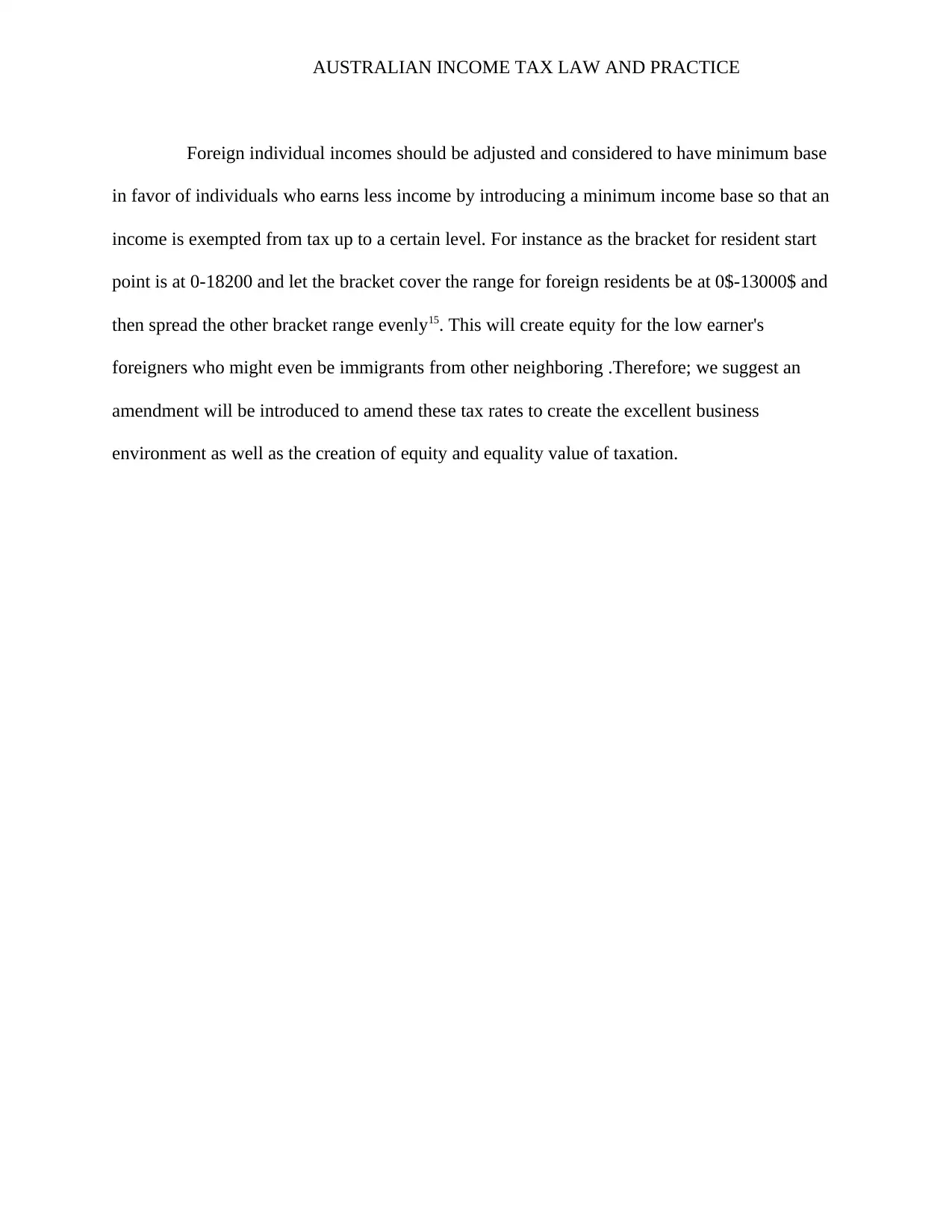
AUSTRALIAN INCOME TAX LAW AND PRACTICE
Foreign individual incomes should be adjusted and considered to have minimum base
in favor of individuals who earns less income by introducing a minimum income base so that an
income is exempted from tax up to a certain level. For instance as the bracket for resident start
point is at 0-18200 and let the bracket cover the range for foreign residents be at 0$-13000$ and
then spread the other bracket range evenly15. This will create equity for the low earner's
foreigners who might even be immigrants from other neighboring .Therefore; we suggest an
amendment will be introduced to amend these tax rates to create the excellent business
environment as well as the creation of equity and equality value of taxation.
Foreign individual incomes should be adjusted and considered to have minimum base
in favor of individuals who earns less income by introducing a minimum income base so that an
income is exempted from tax up to a certain level. For instance as the bracket for resident start
point is at 0-18200 and let the bracket cover the range for foreign residents be at 0$-13000$ and
then spread the other bracket range evenly15. This will create equity for the low earner's
foreigners who might even be immigrants from other neighboring .Therefore; we suggest an
amendment will be introduced to amend these tax rates to create the excellent business
environment as well as the creation of equity and equality value of taxation.
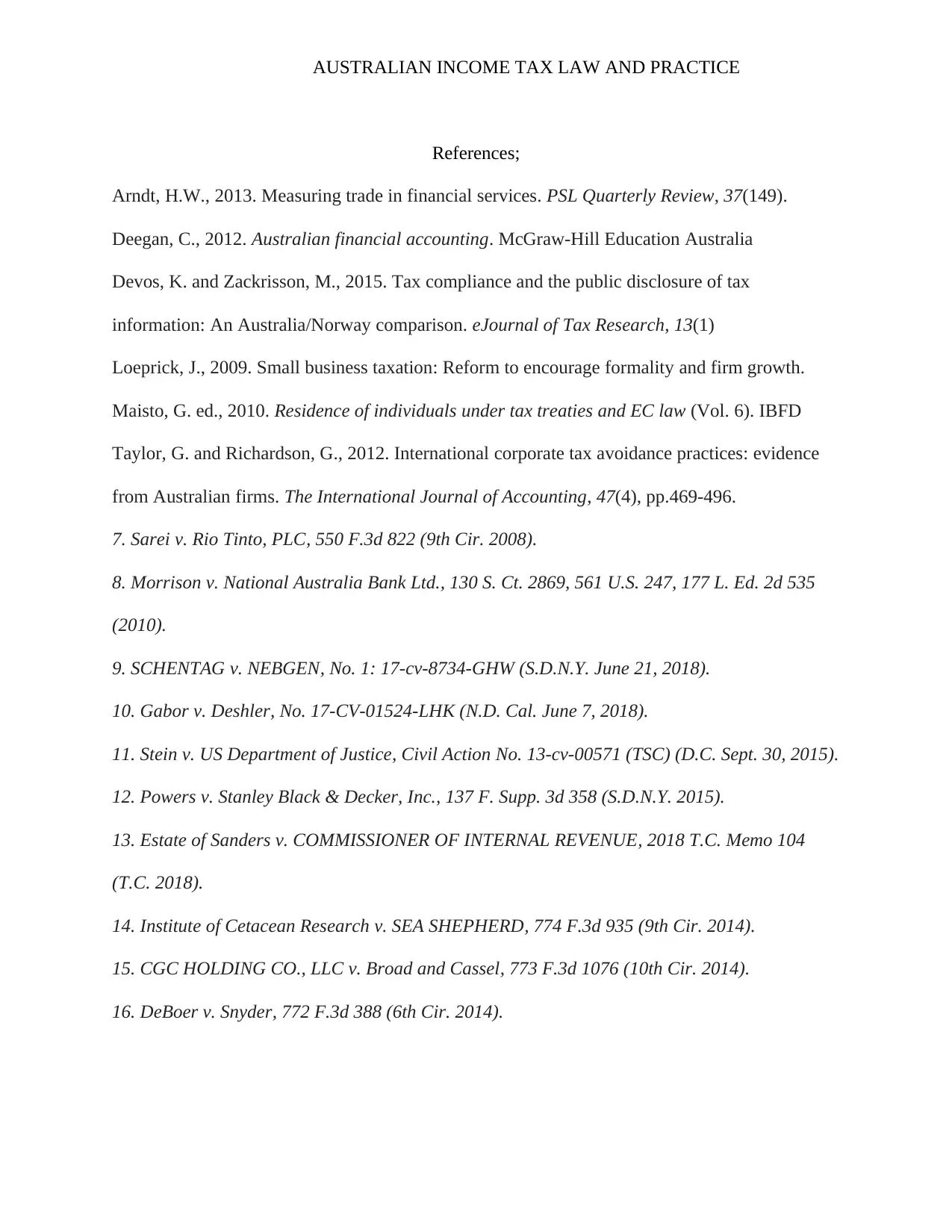
AUSTRALIAN INCOME TAX LAW AND PRACTICE
References;
Arndt, H.W., 2013. Measuring trade in financial services. PSL Quarterly Review, 37(149).
Deegan, C., 2012. Australian financial accounting. McGraw-Hill Education Australia
Devos, K. and Zackrisson, M., 2015. Tax compliance and the public disclosure of tax
information: An Australia/Norway comparison. eJournal of Tax Research, 13(1)
Loeprick, J., 2009. Small business taxation: Reform to encourage formality and firm growth.
Maisto, G. ed., 2010. Residence of individuals under tax treaties and EC law (Vol. 6). IBFD
Taylor, G. and Richardson, G., 2012. International corporate tax avoidance practices: evidence
from Australian firms. The International Journal of Accounting, 47(4), pp.469-496.
7. Sarei v. Rio Tinto, PLC, 550 F.3d 822 (9th Cir. 2008).
8. Morrison v. National Australia Bank Ltd., 130 S. Ct. 2869, 561 U.S. 247, 177 L. Ed. 2d 535
(2010).
9. SCHENTAG v. NEBGEN, No. 1: 17-cv-8734-GHW (S.D.N.Y. June 21, 2018).
10. Gabor v. Deshler, No. 17-CV-01524-LHK (N.D. Cal. June 7, 2018).
11. Stein v. US Department of Justice, Civil Action No. 13-cv-00571 (TSC) (D.C. Sept. 30, 2015).
12. Powers v. Stanley Black & Decker, Inc., 137 F. Supp. 3d 358 (S.D.N.Y. 2015).
13. Estate of Sanders v. COMMISSIONER OF INTERNAL REVENUE, 2018 T.C. Memo 104
(T.C. 2018).
14. Institute of Cetacean Research v. SEA SHEPHERD, 774 F.3d 935 (9th Cir. 2014).
15. CGC HOLDING CO., LLC v. Broad and Cassel, 773 F.3d 1076 (10th Cir. 2014).
16. DeBoer v. Snyder, 772 F.3d 388 (6th Cir. 2014).
References;
Arndt, H.W., 2013. Measuring trade in financial services. PSL Quarterly Review, 37(149).
Deegan, C., 2012. Australian financial accounting. McGraw-Hill Education Australia
Devos, K. and Zackrisson, M., 2015. Tax compliance and the public disclosure of tax
information: An Australia/Norway comparison. eJournal of Tax Research, 13(1)
Loeprick, J., 2009. Small business taxation: Reform to encourage formality and firm growth.
Maisto, G. ed., 2010. Residence of individuals under tax treaties and EC law (Vol. 6). IBFD
Taylor, G. and Richardson, G., 2012. International corporate tax avoidance practices: evidence
from Australian firms. The International Journal of Accounting, 47(4), pp.469-496.
7. Sarei v. Rio Tinto, PLC, 550 F.3d 822 (9th Cir. 2008).
8. Morrison v. National Australia Bank Ltd., 130 S. Ct. 2869, 561 U.S. 247, 177 L. Ed. 2d 535
(2010).
9. SCHENTAG v. NEBGEN, No. 1: 17-cv-8734-GHW (S.D.N.Y. June 21, 2018).
10. Gabor v. Deshler, No. 17-CV-01524-LHK (N.D. Cal. June 7, 2018).
11. Stein v. US Department of Justice, Civil Action No. 13-cv-00571 (TSC) (D.C. Sept. 30, 2015).
12. Powers v. Stanley Black & Decker, Inc., 137 F. Supp. 3d 358 (S.D.N.Y. 2015).
13. Estate of Sanders v. COMMISSIONER OF INTERNAL REVENUE, 2018 T.C. Memo 104
(T.C. 2018).
14. Institute of Cetacean Research v. SEA SHEPHERD, 774 F.3d 935 (9th Cir. 2014).
15. CGC HOLDING CO., LLC v. Broad and Cassel, 773 F.3d 1076 (10th Cir. 2014).
16. DeBoer v. Snyder, 772 F.3d 388 (6th Cir. 2014).
1 out of 9
Related Documents
Your All-in-One AI-Powered Toolkit for Academic Success.
+13062052269
info@desklib.com
Available 24*7 on WhatsApp / Email
![[object Object]](/_next/static/media/star-bottom.7253800d.svg)
Unlock your academic potential
© 2024 | Zucol Services PVT LTD | All rights reserved.





